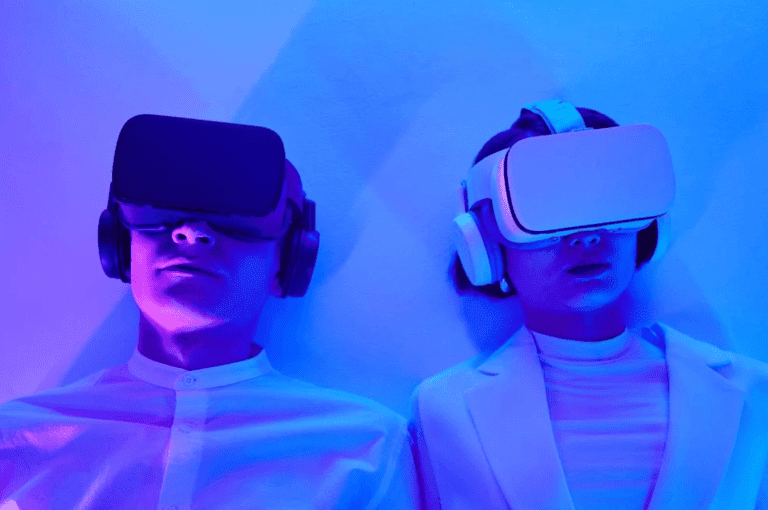Neal Stephenson, the author of the science-fiction novel Snow Crash first coined the term “Metaverse” in 1992. Not many people were familiar with the word until Facebook CEO Mark Zukerberg recently renamed and rebranded Facebook “Meta.”
Since then, the topic has gained immense traction on the internet. Internet users are creating memes and reaction videos regarding Metaverse – the virtual world – and also Mark Zuckerberg’s grand vision.
But what is the link between Metaverse and Ecommerce?
Metaverse aims to create an augmented reality for people to enjoy all sorts of entertainment from the comfort of their homes. So, when all can be done in the virtual world, the concept opens up a new avenue for Ecommerce
It will blend the best parts of online and in-store shopping, making the shopping experience more exciting and personalized for consumers.
We’ll dive deeper into this topic below!

What Is the Metaverse?
Imagine sitting in a history class listening to a boring lecture about the American Revolutionary War. Since you’ll have a hard time processing all the crucial information in real-time, you’ll soon find yourself sleepy or bored.
Now imagine your professor gives you a virtual reality headset, and there you are, witnessing US soldiers defeating enemies right in front of your eyes. How incredible and immersive would that be?
So, would you feel sleepy anymore? We think not. That’s how exciting the metaverse is. That is one of its thousands of utilities.
The technology aims to create a virtual world offering individuals a multitude of digital experiences and ways to interact with others.
It will include a variety of distinct but interlinked digital environments where people will socialize, shop, work, learn, and have fun.
What Is Web 3.0?
After the popularity of Metaverse, the keyword Web 3.0 or Web 3 is taking the internet by storm.
Web 3 is the third version of the internet – an improvement of the current web 2.0.
We’re all aware that web 2.0 made the internet a place to socialize and encouraged us to connect.
Our connections led to large amounts of content and data primarily controlled by Apple, Microsoft, Amazon, Meta, and Google.
Simply put, with web 2.0, users feel they do not have control over their data anymore. In addition to that, they believe their privacy is almost gone.
However, experts predict that web 3.0 can overcome these issues and give people more control over their information, making it more secure and private.
The key features of web 3.0 include 3D graphics, semantic web, artificial intelligence, and ubiquity. This version of the internet aims to make the web more intelligent and assist users through smart programs.

What Opportunities Does the Metaverse Provide?
In a recent blog post, Mastercard highlights an interesting story.
Imagine you’re having a cup of coffee with your friend in a park. She tells you about a pair of sneakers she bought and absolutely loved. She then suggests you buy the same pair.
The next moment, you see digital images of sneakers in front of your eyes .But guess what? You don’t like any of them.
So, an AI assistant opens your customizer. Now, with a swipe of a hand, you can change the color combination, swap the design, and with another motion, you buy the shoes. You can even try them on in the metaverse on your personalized avatar wherever you’d like, even in a virtual fitting room.
You wave goodbye to your friend, but in reality, you were sitting on your couch, at your home.
This explains how the digital world can and will transform the Ecommerce space. The possibilities here are endless.
Whether you’re a creative or an Ecommerce seller, the virtual world opens up new opportunities for you.
Keith Jordan, the vice president of innovation at Mastercard’s Labs as a Service business, mentions, “Mixed reality will be increasingly accessible to businesses and consumers, transforming our lives over the next few years.”
Consumers no longer need to leave their homes or receive packages that didn’t turn out the way they expected.
The fun, exciting, and fulfilling way to shop in Metaverse is good news for Ecommerce sellers, but only if they prepare beforehand.
Advantages of Entering the Metaverse Early and Understanding Web 3 Early
The connection between Metaverse and entrepreneurs is pretty understandable. The digital world is not bound by time or other barriers. Besides, it never pauses; it’s always there – you only need to wear your virtual headset and BOOM! You’re in a whole new world.
This is good news for Ecommerce retailers, but only if they understand the whole idea as early as possible. This will:
- Make the Metaverse less competitive for them.
- Allow entrepreneurs to set their stores accordingly.
- Help them plan hyper-personalized experiences for consumers.
- Allow them to come up with sustainable approaches to serve customers well.
- Help them verify their digital identity.
- Minimize risk of hackers.
The Underlying Technologies and Ecosystems: How Do They Work?
Though the world is moving at a fast pace, our internet is still somewhat unreliable. Each time we connect with others over the internet, copies of our data are made and sent to another PC.
Simply put, we lose control over our privacy. However, the issue doesn’t end here.
It also creates disorganization in operations along the distribution chain of products and services. Perhaps this explains recurring data breaches.
Blockchain, on the other hand, renews the concept of data storage and management. It creates a system of storing data in a way that it’s impossible to hack or alter. Blockchain stores our data in multiple copies of a P2P network, increasing data security, trust, and transparency.
It is designed so that one needs to break into multiple houses – each having an alarm system – to breach them, which is nearly impossible.
What Does the Metaverse Mean for Ecommerce?
The link between Metaverse and Ecommerce is pretty straightforward, and it perhaps describes what it means for online businesses.
Google survey shows that 66% of people say they would like to use AR (augmented reality) when shopping.
Besides, Shopify mentions that products having AR/3D content have a conversion rate of up to 94%!
So, what does that mean for Ecommerce? A world of endless opportunities and increasing sales!

Guide for Ecommerce In Metaverse
Though the time has not arrived yet, it isn’t far away either. So, it’s best to prepare beforehand. Here are what steps you should take as an ecommerce retailer:
- You’ll be developing a VR/AR (something closer to a 3D world), you need to decide on the hardware. Are your customers using smartphones or computers? You have to customize the experience and products accordingly.
- Utilize a powerful 3D engine. The popular ones include Google ARCore, Apple ARKit for Android, and Apple users to begin with AR.
- Fine-tune your content for the virtual world. What works for your website will not work for Metaverse. So, do you need 3D images, 360-degree videos, or music to entice consumers?
- Accept cryptocurrency and connection to wallet extensions such as MetaMask or Phantom Wallet.
- Create 3D visuals and images today to see how your customers respond to them. Make them customizable in real-time.
Final Words
Metaverse felt like a pipedream when Neal Stephenson first mentioned it in his novel. However, with the rebranding of Facebook, and Mark Zuckerberg’s vision, people are optimistic about the world beyond Web 2.0.
If you run an online store, perhaps the mention of Metaverse and ecommerce has stirred your imagination, and for good reason.
The virtual world undoubtedly has a lot to offer to retailers and consumers alike. Before this turns into reality, make sure you fully understand and experiment with related technology to stand out amongst your competitors.

